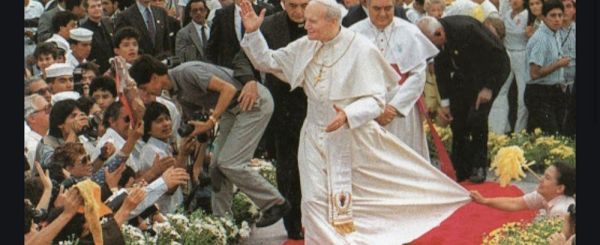1. We are gathered again today, as we are every Sunday, for the common prayer of the Angelus. The reading from today's liturgy (17th Sunday of Ordinary Time) encourages us to reflect on prayer. "Lord, teach us to pray . . ." (Lk 11:1), says one of his disciples to Christ in the Gospel. And he answers them by recalling the example of a man, yes, an importunate man, who, finding himself in need, knocks on his friend's door even at midnight. But he gets what he asks for. Jesus, therefore, encourages us to have a similar attitude in prayer: that of ardent perseverance. He says: "Ask and it will be given to you, seek and you will find, knock and it will be opened to you . . ." (Lk 11:9).
A model of such persevering, humble and, at the same time, trusting prayer is found in the Old Testament, in Abraham, who pleads with God for the salvation of Sodom and Gomorrah, if at least ten righteous people would be found there.
2. Thus we must encourage ourselves more and more to prayer. We must often remember Christ's exhortation: 'Ask and it shall be given you, seek and you shall find, knock and it shall be opened to you'. In particular, we must remember it when we lose confidence or the will to pray.
We must also always relearn how to pray. It often happens that we refrain from praying with the excuse that we do not know how to pray. If we really do not know how to pray, all the more then it is necessary to learn it. This is important for everyone, and it seems to be especially important for young people, who often neglect the prayer they learned as children because it seems to them too childish, naive, shallow. Instead, such a state of consciousness constitutes an indirect stimulus to deepen one's own prayer, to make it more reflective, more mature, to seek support for it in the word of God Himself and in the Holy Spirit, who "intercedes for us persistently, with inexpressible groanings", as St Paul writes (Rom 8:26).
3. I know that many people in Italy, in Poland and throughout the world pray for the Pope, and many join with him in prayer, embracing in their hearts the problems that are the object of his entreaties to God. On today's occasion, I would like to say how enormously grateful I am for this remembrance and for this union in prayer. It is a great help and support, for which I do not cease to thank God daily. With this act of gratitude I embrace all my benefactors, known and unknown, and especially those who complete their prayers with the spiritual sacrifice of suffering.
And while for this I give thanks publicly, on today's occasion, I do not cease to repeat to myself and others: 'Ask and it will be given to you, seek and you will find, knock and it will be opened to you'. Yes, dear brothers and sisters. There is an enormous need for prayer, for the great and unceasing prayer of the Church; there is a need for fervent, humble and persevering prayer. It is the first front where good and evil, in our world, confront each other. It makes way for good and serves to overcome evil. Prayer obtains divine grace and mercy for the world. It elevates men to the dignity, which the Son of God gave them, when, united with him, they repeat: "Our Father".
We also rightly speak of the apostolate of prayer. Rightly there is an association that bears this name. Prayer is the first apostolate, the fundamental and most universal one for each and everyone.
[Pope John Paul II, Angelus 27 July 1980]












